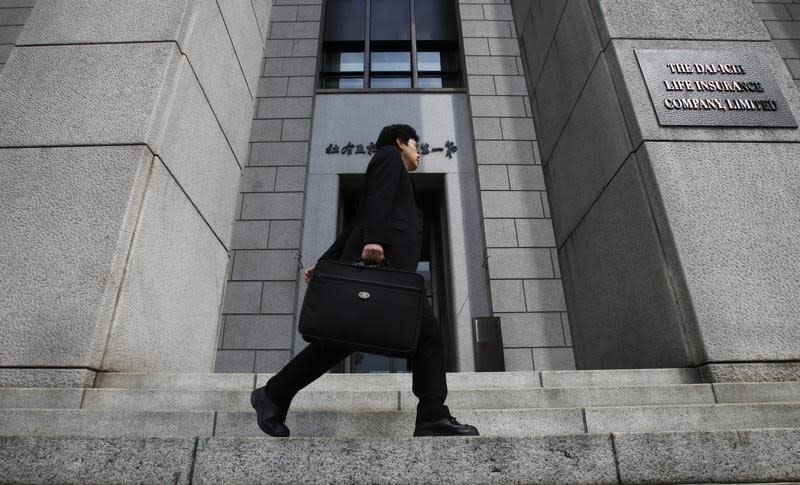Japan’s Dai-ichi Life in talks to buy Protective Life for $5 billion: source
June 3, 2014 by Taiga Uranaka; Additional reporting by; Gregory Roumeliotis, Ayai Tomisawa and Emi Emoto; Editing by Richard Pullin and Kenneth Maxwell
TOKYO (Reuters) – Japanese insurer Dai-ichi Life Co is in advanced talks to buy U.S. peer Protective Life Corp in a deal that could be worth over $5 billion, extending a drive to buy assets abroad as an antidote to a weak domestic outlook.
The deal would be the biggest so far in a string of overseas acquisitions by Japan’s insurers. They’re snapping up businesses in markets from the United States to Southeast Asia as a path to future growth while the rapid ageing and eventual shrinkage of Japan’s population clouds long-term earnings prospects at home.
Dai-ichi Life, Japan’s second-largest private-sector life insurer, plans to buy 100 percent of Protective Life, said a source with direct knowledge of the matter. The 107-year-old U.S. company, based in Birmingham, Alabama, has a market capitalization of $4 billion and posted a net profit of $393.5 million in 2013 from operations that span the country.
“For top (Japanese) insurers with large market share like Dai-ichi Life, it would be very difficult to secure growth when the overall domestic life insurance market starts shrinking,” said Teruki Morinaga, insurance sector analyst at Fitch Ratings in Tokyo. “So, it has to go overseas,” he said, adding he was commenting based on media reports and hadn’t independently verified their accuracy.
In a statement to the Tokyo Stock Exchange, Dai-ichi Life said, “It is true that we are considering an acquisition of a U.S. life insurance company. But nothing has been decided.” A spokesman declined to comment further.
Eva Robertson, vice-president of investor relations at Protective Life, said in an email to Reuters that the company declined to comment, citing company policy on media reports.
The source, who was not authorized to discuss the matter, said Dai-ichi Life, worth close to $15 billion by market value, is planning to fund half of the acquisition cost from existing reserves if the deal goes through. The remainder would be sought externally, the source said, including a possible share issue, along with loans.
As investors fretted over the potential for a dilutive impact on their holdings from a deal, Dai-ichi Life’s shares sank 5 percent by the close in Tokyo in heavy trading, compared with a gain of 2.1 percent gain in the broader market. In a separate statement, the company confirmed it is considering fund-raising options including the issue of new shares.
“The acquisition itself is positive for the company in the long term, but the market is wondering how the company will finance it,” said Mitsushige Akino, chief fund manager at Ichiyoshi Asset Management. “Dilution fears from a possible share offering plan hit investor sentiment.”
POPULATION RISK
Japan is the world’s second-largest life insurance market after the United States by premium revenue. For now players enjoy relatively stable income, but the ageing, and ultimately dwindling population represents a risk for insurers – and many companies whose business model is based on selling goods and services in the country.
From a peak of about 128 million in recent years, Japan’s population is forecast to fall 14 percent to close to 110 million by 2035.
Japanese companies are accelerating overseas acquisitions as one strategy for shoring up earnings. So far this year, they have spent $27 billion on mergers and acquisitions outside Japan, up from $10.4 billion during the same period a year ago, Thomson Reuters data shows.
In one example, earlier this year, drinks maker Suntory Holdings Ltd SUNTH.UL bought U.S. spirits company Beam for $13.6 billion cash in a deal that would make the Japanese company the world’s third-largest spirits maker. (Full Story)
In the insurance sector, last month, Japan’s largest private-sector life insurer, Nippon Life Insurance Co NPNLI.UL, joined Japanese peers expanding in rapidly growing Southeast Asian markets by agreeing to buy 20 percent of Indonesia’s Sequis Life for 4.87 trillion rupiah ($417.13 million). (Full Story)
Dai-ichi Life, the sole listed company among Japan’s top four life insurers, has forged ahead in overseas deals – and reaped the benefit. It said in 2013 it was ready to spend 300 billion yen in mergers and acquisitions over the next two years.
Acquisitions by the company include the buyout of Tower Australia Group for $1.2 billion in 2010 and a 40 percent stake in Panin Life of Indonesia for $337 million in 2013.
For the year ended in March, Dai-ichi Life was the only major life insurer to post growth in insurance premium revenue, boosted by its Australian unit. Sluggish domestic business weighed on its rivals.
The biggest acquisition by a Japanese insurer so far is Tokio Marine Holdings Inc’s 8766.T purchase of property and casualty insurer Philadelphia Consolidated Holding Corp of the United States for about $4.7 billion in 2008.
Many purchases by Japanese insurance companies have focused on emerging Southeast Asian companies. But Fitch Ratings’ Morinaga said that due to strict foreign ownership rules, investments in these companies tend to be minority stakes, and expensive by valuation given emerging markets’ high growth potential.
“Acquisition of companies in developed markets, on the other hand, are not exceedingly high in valuation and would contribute to earnings in relatively short term because they tend to be bigger in size,” he said.
Goldman Sachs is advising Dai-ichi Life on the planned acquisition, according to two sources with direct knowledge of the matter.

